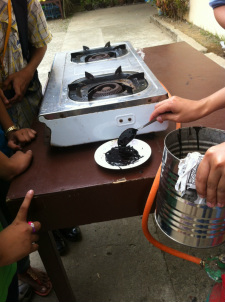Experiment: How much sugar does a liter of cola have?
Do you know how much sugar is in a liter of cola/soda/softdrinks? How much sugar should a young person be allowed to eat/drink on a daily basis? Do you know the answer to these questions?
In the 2014 celebration of Nutrition Month in July, HLC's School Administrator and science teachers demonstrated through a simple experiment the average sugar content of a liter of cola. To heighten the students' and parents' awareness of the negative effects of excessive amounts of sugar in children's diets, the school's nurse and science teacher explained how sugar is a contributing factor to many diseases including obesity, diabetes, tooth decay, and high blood pressure, and has many harmful effects on the health of growing children. According to research, the recommended maximum allowable daily intake of sugar for children ages 3 to 8 should be 3 teaspoons. For teenagers, the maximum amount of sugar added to their daily diet should be 5 to 8 teaspoons. The truth is, however, that most Filipino children, teenagers, and adults consume at least twice the recommended allowable intake.
To demonstrate the levels of sugar content in a liter of soda, the science teacher and the School Administrator boiled a liter of Coca-Cola in front of the curious students (see photos below). Everyone took a stab at how many teaspoons of sugar could be found in a bottle of Coke. Most guessed 2 or 1. In actuality, a liter of Coke has 108 grams of sugar and adds 400 calories from sugar to your diet. That's equivalent to 25 teaspoons of sugar! A 12-oz serving of Coke has 9 1/3 teaspoons of sugar. Imagine what that looks like. Unfortunately, soft drinks are a very common staple in the Filipino diet - you can find it served during merienda, lunch, and dinner.
In the 2014 celebration of Nutrition Month in July, HLC's School Administrator and science teachers demonstrated through a simple experiment the average sugar content of a liter of cola. To heighten the students' and parents' awareness of the negative effects of excessive amounts of sugar in children's diets, the school's nurse and science teacher explained how sugar is a contributing factor to many diseases including obesity, diabetes, tooth decay, and high blood pressure, and has many harmful effects on the health of growing children. According to research, the recommended maximum allowable daily intake of sugar for children ages 3 to 8 should be 3 teaspoons. For teenagers, the maximum amount of sugar added to their daily diet should be 5 to 8 teaspoons. The truth is, however, that most Filipino children, teenagers, and adults consume at least twice the recommended allowable intake.
To demonstrate the levels of sugar content in a liter of soda, the science teacher and the School Administrator boiled a liter of Coca-Cola in front of the curious students (see photos below). Everyone took a stab at how many teaspoons of sugar could be found in a bottle of Coke. Most guessed 2 or 1. In actuality, a liter of Coke has 108 grams of sugar and adds 400 calories from sugar to your diet. That's equivalent to 25 teaspoons of sugar! A 12-oz serving of Coke has 9 1/3 teaspoons of sugar. Imagine what that looks like. Unfortunately, soft drinks are a very common staple in the Filipino diet - you can find it served during merienda, lunch, and dinner.

So, what were the results of the experiment? Cola is basically made up of carbonated water, high-fructose corn syrup or sugar, caffeine, phosphoric acid, and artificial coloring and flavor. If you boil down this liquid, naturally, the water evaporates and what remains is a sticky, dark substance composed of the burned sugars and other chemicals. (See image on the right.) This substance hardens immediately after you take it off the heat. If you want to replicate this experiment, use disposable equipment as you will be unable to clean the hardened substance off. Now, imagine what that does to your stomach.
All soft drinks, whether regular or diet, have little or no nutritional value and contain plenty of additives, such as caffeine or phosphoric acid, which could potentially cause health problems.
All soft drinks, whether regular or diet, have little or no nutritional value and contain plenty of additives, such as caffeine or phosphoric acid, which could potentially cause health problems.

 RSS Feed
RSS Feed
